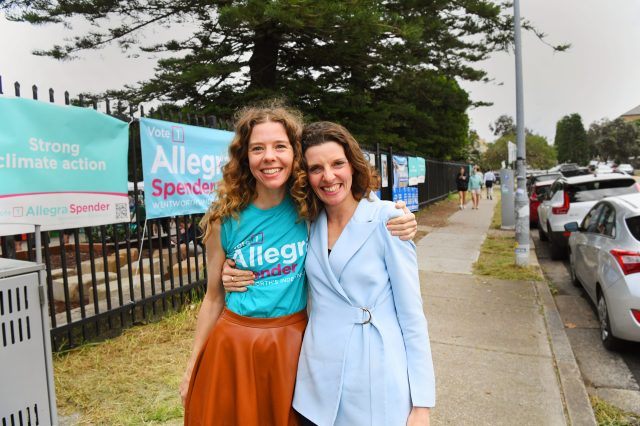Not doctors’ wives. (James D. Morgan/Getty Images)

For the first time in nearly a decade, Australia has a Labor Government. On Monday, Australian Labor Party (ALP) leader Anthony Albanese was sworn in as the country’s 31st Prime Minister. How did he secure victory?
One explanation is that “Albo”, as Albanese is affectionately known, and his strategists got it right with their policy-lite, “small target” strategy. Labor unexpectedly lost the 2016 General Election by standing on a policy-rich programme which created many targets for their Liberal opponents to scaremonger about. This time, nothing was left to chance. The ALP’s promises were so minimal that there was no threat to any existing or potential voters. Their campaign was run, in Roy Jenkins’s famous phrase, like a museum curator carrying a priceless Ming vase across a highly polished wooden floor — avoiding any slip at all costs.
Labor’s primary vote — the number of people making the ALP their first choice — dropped to a historic low, but while voting in some regions is set to go on for days, and indeed weeks, Labor are likely to get to the 76 seats they need to form a majority in the small 151-seat House of Representatives. That’s because the Liberal party, who govern in coalition with the National party, has lost at least 21 seats.
Why such a big loss? The simple answer is that, in the words of the Australian journalist Laura Tingle, this was “the climate change election”. Neither of the two main parties wanted the election to be on these terms — Labor because of their massive defeat at the hands of Liberal party leader Tony Abbott in the “carbon tax” election, and the Liberals because of a deep split between realists and deniers in their party. But voters had a different view: the increasing frequency of bushfires and flooding in Australia in the last few years ensured climate action was top of their agenda.
The Australian electoral system is an Alternative Vote (AV) system), in which you vote for first and second-choice parties. This entrenches the two largest parties by channelling the votes for smaller parties votes towards major parties once first preferences have been counted. But this time around, the system was derailed by the creation of a new party: the “Teal” Independents. The “Teals”, named for their campaign colours and for their political positioning — green-leaning “blue” politicians — are in effect an Australian form of Macron’s En Marche.
First, they ran as a “start-up”, and like all disruptors were free of the constraints of legacy organisations. I remember being told by Ismael Melien, Emanuel Macron’s adviser and campaign strategist, that the most important book he read before setting up En Marche wasn’t a political campaign textbook but a book by the CEO of a successful software start-up, which gave him the confidence to “make it new” from top to bottom.
The Teals brought new people into politics. In the “Teal” target seats of Goldstein and Kuyong in Melbourne, and Warringah and Wentworth in Sydney, 800-900 volunteers came out: mainly cashed-up female retirees in their first ever political campaign. The Teals, then, are an expression of the continuing feminisation of Australian politics. The Liberal party had resisted positive action for women in selections for parliament. The Liberal leadership’s view, as often with incumbents. was that conservative-leaning women had nowhere else to go. They were wrong — and the Liberal party learned two hard truths: sisters could do it for themselves; and that once you break one link of party discipline (membership) you find it easier to break others (on policy).
And so they hit the streets, leafleting shopping centres and malls, and they hit the doorsteps, in many constituencies knocking on every single door. It was a tsunami of “Teals”. And they used humour, producing “Throw them out” posters that could be stuck on wheelie bins, so that at least once a week their message was rolled out through the electorate. One, now former, Liberal MP Tim Wilson, ill-advisedly took legal action to ban some posters opposing him; he won in court, but lost in the court of public opinion.
There was a nimbleness and flexibility about the “Teals” that neither the Liberals nor Labor could compete with. They were a network rather than a party — a vibe as much as a movement.
In a sense the rise of the Teals is all about demographics. Since Liberal Prime Minister John Howard won a series of victories over the ALP by winning over “battlers” — the lower middle class, small business, “tradies” — Australian politics has focused on swing seats in the outer suburbs. The small ‘l’ liberal women voters in the inner suburbs were dismissed as “doctors’ wives” — well-meaning, bleeding hearts who wouldn’t determine any election. Well, it turns out they matter. They’re not “doctors’ wives” any more — they’re doctors, themselves or surgeons, lawyers, accountants, and executives. More importantly, professional women as a class are now larger in number than tradies. Demographic change isn’t political destiny, but it sure feels like it when you have been chucked out on your ear.










Join the discussion
Join like minded readers that support our journalism by becoming a paid subscriber
To join the discussion in the comments, become a paid subscriber.
Join like minded readers that support our journalism, read unlimited articles and enjoy other subscriber-only benefits.
Subscribe